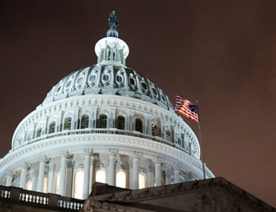
White evangelical Protestants differ substantially from other Americans when it comes to the level of influence religion should have on a range of government policies, according to a recent national survey conducted by The Associated Press-NORC Center for Public Affairs Research. White evangelical Protestants also tend to hold considerably more conservative opinions about those policies than other Americans.
Most white evangelical Protestants think religion should have more influence on government policies than is currently the case; other Americans are more inclined to say religion should be less influential. In many cases, Americans who hold more conservative attitudes on particular policies are more inclined than others to say religion should influence those issues.
For example, 37% of all Americans favor making abortion illegal except in cases of rape, incest or to threats to the mother’s life; 67% of white evangelical Protestants favor such restrictions on abortion. Sixty-seven percent of white evangelical Protestants say religion does influence government policy on abortion, but even more (80%) think religion should impact policy. In comparison, other Americans are more likely to say religion does play a part in the government’s policies on abortion (79%) and much less likely to think religion should do so (41%).
White evangelical Protestants and other Americans have similar opinions about school vouchers. Forty percent of white evangelical Protestants favor vouchers for low-income children to attend religious and private schools, and 42% of other Americans agree. But looking at education policy more broadly, 69% of white evangelical Protestants think religion should influence education policy, but only 37% of other Americans agree.
The nationwide poll was conducted December 5-9, 2019, using the AmeriSpeak Panel®, the probability-based panel of NORC at the University of Chicago. Online and telephone interviews using landlines and cell phones were conducted with 1,053 adults. The margin of sampling error is plus or minus 4.0 percentage points.



